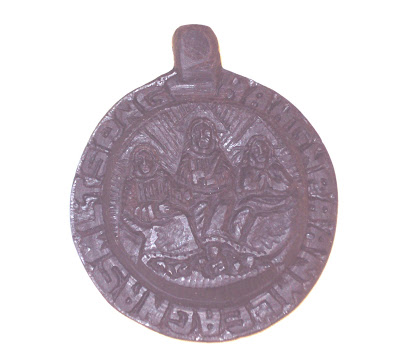
ONE of the most interesting legends concerning the cross is that preserved in Aurea Legenda, by
Jacobus de Vorgaine. The Story is to the effect that Adam, feeling the end of his life was near, entreated
his son Seth to make a pilgrimage to the Garden of Eden and secure from the angel on guard at the
entrance the Oil of Mercy which God had promised mankind. Seth did not know the way; but his father
told him it was in an eastward direction, and the path would be easy to follow, for when Adam and Eve
were banished from the Garden of the Lord, upon the path which their feet had trod the grass had never
grown.
Seth, following the directions of his father, discovered the Garden of Eden without difficulty. The angel
who guarded the gate permitted him to enter, and in the midst of the garden Seth beheld a great tree, the
branches of which reached up to heaven. The tree was in the form of a cross, and stood on the brink of a
precipice which led downward into the depths of hell. Among the roots of the tree he saw the body of his
brother Cain, held prisoner by the entwining limbs. The angel refused to give Seth the Oil of Mercy, but
presented him instead with three seeds from the Tree of Life (some say the Tree of Knowledge). With
these Seth returned to his father, who was so overjoyed that he did not desire to live longer. Three days
later he died, and the three seeds were buried in his mouth, as the angel had instructed. The seeds
became a sapling with three trunks in one, which absorbed into itself the blood of Adam, so that the life
of Adam was in the tree. Noah dug up this tree by the roots and took it with him into the Ark. After the
waters subsided, he buried the skull of Adam under Mount Calvary, and planted the tree on the summit
of Mount Lebanon.
Moses beheld a visionary being in the midst of this tree (the burning bush) and from it cut the magical
rod with which he was able to bring water out of a stone. But because he failed to call upon the Lord the
second time he struck the rock, he was not permitted to carry the sacred staff into the Promised Land; so
he planted it in the hills of Moab. After much searching, King David discovered the tree; and his son,
Solomon, tried to use it for a pillar in his Temple, but his carpenters could not cut it so that it would fit;
it was always either too long or too short. At last, disgusted, they cast it aside and used it for a bridge to
connect Jerusalem with the surrounding hills. When the Queen of Sheba came to visit King Solomon she
was expected to walk across this bridge. Instead, when she beheld the tree, she refused to put her foot
upon it, but, after kneeling and praying, removed her sandals and forded the stream. This so impressed
King Solomon that he ordered the log to be overlaid with golden places and placed above the door of his
Temple. There it remained until his covetous grandson stole the gold, and buried the tree so that the
crime would not be discovered.
From the ground where the tree was buried there immediately bubbled forth a spring of water, which
became known as Bethesda. To it the sick from all Syria came to be healed. The angel of the pool
became the guardian of the tree, and it remained undisturbed for many years. Eventually the log floated
to the surface and was used as a bridge again, this time between Calvary and Jerusalem; and over it
Jesus passed to be crucified. There was no wood on Calvary; so the tree was cut into two parts to serve
as the cross upon which the Son of Man was crucified. The cross was set up at the very spot where the
skull of Adam had been buried. Later, when the cross was discovered by the Empress Helena, the wood
was found to be of four different varieties contained in one tree (representing the elements), and
thereafter the cross continued to heal all the sick who were permitted to touch it.
The prevalent idea that the reverence for the cross is limited to the Christian world is disproved by even
the most superficial investigation of its place in religious symbolism. The early Christians used every
means possible to conceal the pagan origin of their symbols, doctrines, and rituals. They either destroyed
the sacred books of other peoples among whom they settled, or made them inaccessible to students of
comparative philosophy, apparently believing that in this way they could stamp out all record of the pre-
Christian origin of their doctrines. In some cases the writings of various ancient authors were tampered
with, passages of a compromising nature being removed or foreign material interpolated. The
supposedly spurious passage in Josephus concerning Jesus is an example adduced to illustrate this
proclivity.
Jacobus de Vorgaine. The Story is to the effect that Adam, feeling the end of his life was near, entreated
his son Seth to make a pilgrimage to the Garden of Eden and secure from the angel on guard at the
entrance the Oil of Mercy which God had promised mankind. Seth did not know the way; but his father
told him it was in an eastward direction, and the path would be easy to follow, for when Adam and Eve
were banished from the Garden of the Lord, upon the path which their feet had trod the grass had never
grown.
Seth, following the directions of his father, discovered the Garden of Eden without difficulty. The angel
who guarded the gate permitted him to enter, and in the midst of the garden Seth beheld a great tree, the
branches of which reached up to heaven. The tree was in the form of a cross, and stood on the brink of a
precipice which led downward into the depths of hell. Among the roots of the tree he saw the body of his
brother Cain, held prisoner by the entwining limbs. The angel refused to give Seth the Oil of Mercy, but
presented him instead with three seeds from the Tree of Life (some say the Tree of Knowledge). With
these Seth returned to his father, who was so overjoyed that he did not desire to live longer. Three days
later he died, and the three seeds were buried in his mouth, as the angel had instructed. The seeds
became a sapling with three trunks in one, which absorbed into itself the blood of Adam, so that the life
of Adam was in the tree. Noah dug up this tree by the roots and took it with him into the Ark. After the
waters subsided, he buried the skull of Adam under Mount Calvary, and planted the tree on the summit
of Mount Lebanon.
Moses beheld a visionary being in the midst of this tree (the burning bush) and from it cut the magical
rod with which he was able to bring water out of a stone. But because he failed to call upon the Lord the
second time he struck the rock, he was not permitted to carry the sacred staff into the Promised Land; so
he planted it in the hills of Moab. After much searching, King David discovered the tree; and his son,
Solomon, tried to use it for a pillar in his Temple, but his carpenters could not cut it so that it would fit;
it was always either too long or too short. At last, disgusted, they cast it aside and used it for a bridge to
connect Jerusalem with the surrounding hills. When the Queen of Sheba came to visit King Solomon she
was expected to walk across this bridge. Instead, when she beheld the tree, she refused to put her foot
upon it, but, after kneeling and praying, removed her sandals and forded the stream. This so impressed
King Solomon that he ordered the log to be overlaid with golden places and placed above the door of his
Temple. There it remained until his covetous grandson stole the gold, and buried the tree so that the
crime would not be discovered.
From the ground where the tree was buried there immediately bubbled forth a spring of water, which
became known as Bethesda. To it the sick from all Syria came to be healed. The angel of the pool
became the guardian of the tree, and it remained undisturbed for many years. Eventually the log floated
to the surface and was used as a bridge again, this time between Calvary and Jerusalem; and over it
Jesus passed to be crucified. There was no wood on Calvary; so the tree was cut into two parts to serve
as the cross upon which the Son of Man was crucified. The cross was set up at the very spot where the
skull of Adam had been buried. Later, when the cross was discovered by the Empress Helena, the wood
was found to be of four different varieties contained in one tree (representing the elements), and
thereafter the cross continued to heal all the sick who were permitted to touch it.
The prevalent idea that the reverence for the cross is limited to the Christian world is disproved by even
the most superficial investigation of its place in religious symbolism. The early Christians used every
means possible to conceal the pagan origin of their symbols, doctrines, and rituals. They either destroyed
the sacred books of other peoples among whom they settled, or made them inaccessible to students of
comparative philosophy, apparently believing that in this way they could stamp out all record of the pre-
Christian origin of their doctrines. In some cases the writings of various ancient authors were tampered
with, passages of a compromising nature being removed or foreign material interpolated. The
supposedly spurious passage in Josephus concerning Jesus is an example adduced to illustrate this
proclivity.
















































